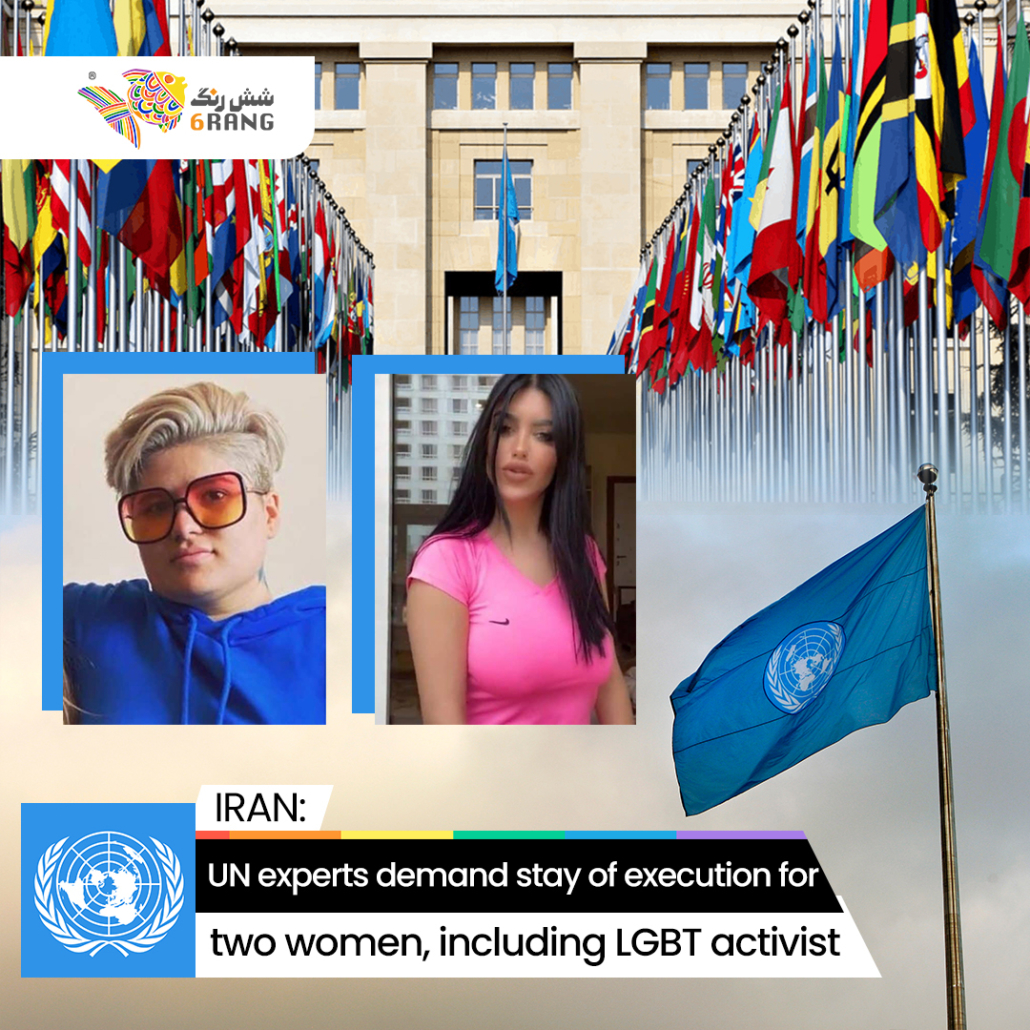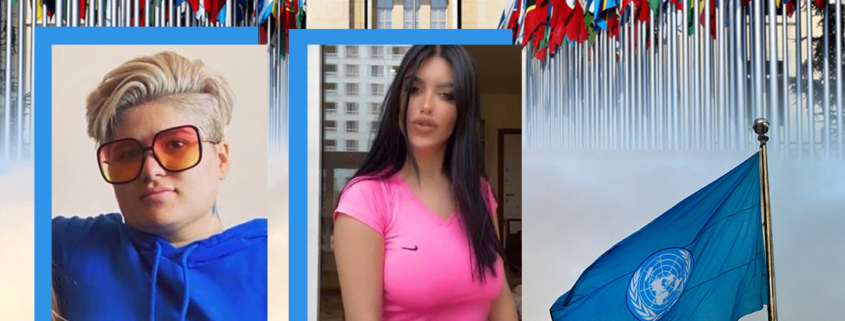Iran: UN experts demand stay of execution for two women, including LGBT activist
Having zealously campaigned for Sareh and Elham for the past few months, 6Rang welcomes Geneva’s reaction: UN experts demand halt of execution for the two LGBTI activists on death row in Urumieh.

Three working groups, four Special Rapporteurs, one Expert on SOGIESC issues and the Special Rapporteur for Iran have strongly condemned Iran’s treatment of LGBTI human rights activists and their use of the death penalty.
6Rang’s efforts to mobilize all international instruments to defend and save Sareh and Elham have not been in vain. This UN statement sheds light on the Islamic Regime’s disregard for human life at a critical time, giving Iranians much needed hope.
Full Statement:
GENEVA (28 September 2022) – Iran must immediately halt the executions of two women sentenced to death in relation to their support for the human rights of LGBT people, UN experts* said today.
Iranian judicial authorities prosecuted human rights defender Zahra Sedighi-Hamadani and Elham Choubdar in August 2022 and notified them on 1 September 2022 that they had been convicted and sentenced to death by the Islamic Revolution Court of Urumieh.
They were convicted on charges of “corruption on earth” and “trafficking”.
“We strongly condemn the sentencing of Ms. Sedighi-Hamadani and Ms. Choubdar to death and call on authorities to stay their executions and annul their sentences as soon as possible,” the experts said. “Authorities must ensure the health and well-being of both women, and promptly release them from detention.”
Iran’s legal system explicitly prohibits homosexuality and same-sex relations are punishable by death under the country’s penal code.
While the judicial decision and sentencing order are not public, the experts were informed that the charges concerned speech and actions in support of the human rights of lesbian, gay, bisexual, and trans and other gender-diverse (LGBT) persons who face discrimination in Iran based on their sexual orientation and gender identity. The experts also received reports that the trafficking charges against the women were related to their efforts to assist persons at risk to leave Iranian territory.
The experts have expressed concerns to the Government of Iran that the two women may have been arbitrarily detained, ill-treated, and prosecuted on the discriminatory basis of sexual orientation or gender identity, including criminalisation of LGBT people whose human rights they were supporting through speech and peaceful action. To date, no response has been received.
Sedighi-Hamedani was arrested on 27 October 2021 by Islamic Revolutionary Guards near the Iranian border with Türkiye. Choubdar was arrested on an unknown date afterwards. Sedighi-Hamedani was reportedly forcibly disappeared for 53 days following her arrest and subjected to abuse and discriminatory insults in a detention centre in Urumieh, where she was held from October to December 2021.
“We urge Iran’s authorities to investigate the alleged ill-treatment of Ms. Sedighi-Hamadani while in detention, her enforced disappearance for 53 days, and the failure of judicial authorities to ensure due process in both women’s cases, which may also have violated their right to a fair trial among other human rights,” the UN experts said.
“We call on Iran to repeal the death penalty, and at a minimum reduce the scope of its application to only criminal actions that meet the threshold of the most serious crimes,” the experts said.
“Authorities have an international obligation to ensure that all human rights defenders in Iran can conduct peaceful and legitimate activities without fear of persecution or reprisals, including those working on sensitive issues such as sexual orientation and gender identity,” they said.
The UN experts are closely monitoring the situation and remain in contact with Iranian authorities.ENDS
*The experts: Miriam Estrada-Castillo (Chair-Rapporteur), Mumba Malila (Vice-chairperson), Elina Steinerte, Priya Gopalan, and Matthew Gillett, Working Group on arbitrary detention; Melissa Upreti (Chair), Dorothy Estrada Tanck (Vice-Chair), Elizabeth Broderick, Ivana Radačić, and Meskerem Geset Techane, Working Group on discrimination against women and girls; Luciano Hazan (Chair-Rapporteur), Aua Baldé (Vice-Chair), Gabriella Citroni, Angkhana Neelapaijit, Grazyna Baranowska. Working Group on enforced or involuntary disappearances; Victor Madrigal-Borloz, Independent Expert on protection against violence and discrimination based on sexual orientation and gender identity; Morris Tidball-Binz, Special Rapporteur on extrajudicial, summary or arbitrary executions; Irene Khan, Special Rapporteur on the promotion and protection of the right to freedom of opinion and expression; Mary Lawlor, Special Rapporteur on the situation of human rights defenders; Javaid Rehman, Special Rapporteur on the situation of human rights in the Islamic Republic of Iran; and Reem Alsalem, Special Rapporteur on violence against women and girls, its causes and consequences.
The Independent Experts, Working Groups and Special Rapporteurs are part of what is known as the Special Procedures of the Human Rights Council. Special Procedures, the largest body of independent experts in the UN Human Rights system, is the general name of the Council’s independent fact-finding and monitoring mechanisms that address either specific country situations or thematic issues in all parts of the world. Special Procedures’ experts work on a voluntary basis; they are not UN staff and do not receive a salary for their work. They are independent from any government or organization and serve in their individual capacity.


Leave a Reply
Want to join the discussion?Feel free to contribute!